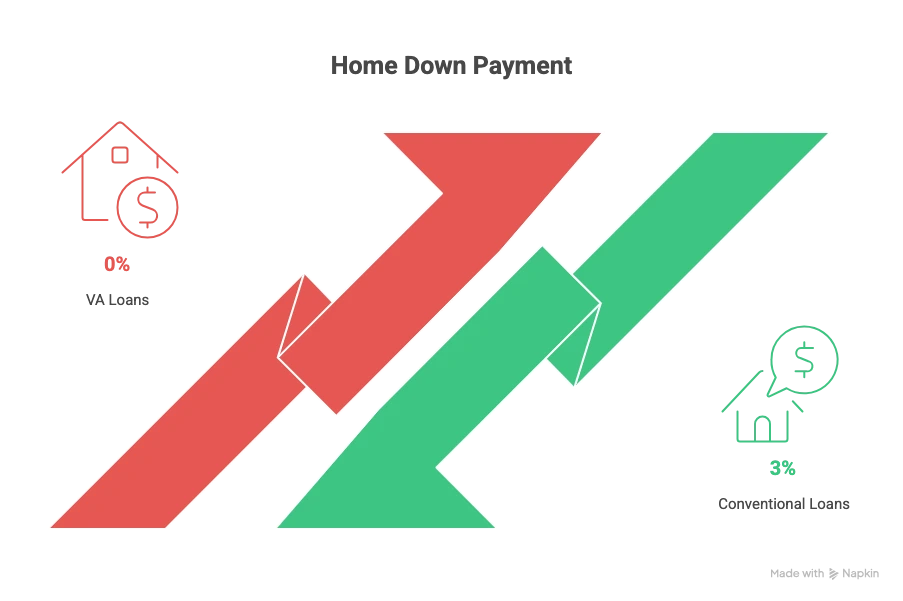Down Payment Calculator: Explore Scenarios from 3% to 20%
Determining the right down payment is one of the most important decisions you’ll make when buying a home. It affects your total loan amount, the size of your monthly payment, and your long-term interest costs. Use our Down Payment Calculator to explore different scenarios and see how adjusting your upfront investment changes the entire landscape of your mortgage.
Affordable Home Price
$0
Breakdown of Upfront Cash
Down Payment
$0
Closing Costs
$0
Loan Amount
$0
Est. Monthly Payment
$0
How to Use Our Down Payment Calculator
Simply enter a target home price and experiment with different down payment amounts to see the immediate and long-term financial impact.
Home Price: Enter the purchase price of the home you are considering.
Down Payment: You can enter this as a percentage (%) or a specific dollar amount ($). Try starting with common amounts like 3.5% (FHA minimum), 5% (Conventional minimum), 10%, or the traditional 20% to see how the results change.
Loan Term (Years): Choose the length of the loan, typically 30 or 15 years.
Interest Rate (%): Input an estimate for the mortgage interest rate you expect to qualify for.
Understanding Your Results: The Power of a Down Payment
This calculator does more than just calculate a number—it shows you the financial consequences of your down payment choice. A larger down payment has three powerful benefits: it reduces your monthly payment, helps you avoid Private Mortgage Insurance (PMI), and lowers the total interest you pay over time.
See how a down payment on a $400,000 home can change your financial picture:
| Metric | 5% Down Payment | 10% Down Payment | 20% Down Payment |
| Down Payment Amount | $20,000 | $40,000 | $80,000 |
| Loan Amount | $380,000 | $360,000 | $320,000 |
| Estimated Monthly PMI | ~$190/mo | ~$150/mo | $0 |
| Est. Monthly Payment (P&I + PMI) | ~$2,655 | ~$2,430 | ~$2,057 |
| Total Interest Paid (30 Yrs) | ~$415,800 | ~$394,800 | $350,480 |
(Estimates based on a 6.5% interest rate over 30 years. PMI is an estimate and can vary.)
As you can see, crossing the 20% down payment threshold eliminates PMI entirely and saves you over $65,000 in total interest compared to the 5% option.
Mortgage Scenario Comparison
Visualize how loan terms affect your payments and total interest.
Frequently Asked Questions About Down Payments
How much do I really need for a down payment in 2025?
The long-standing myth is that you must have 20% down to buy a home. This is not true. In 2025, there are many loan programs available that require much less:
Conventional Loans: Can require as little as 3% to 5% down.
FHA Loans: Require a minimum of 3.5% down.
VA and USDA Loans: May require 0% down for eligible borrowers.
However, while you don’t need 20%, aiming for it is a powerful goal. A 20% down payment allows you to avoid PMI, reduces your monthly payment, and may help you secure a lower interest rate.
What is PMI and how does the down payment help me avoid it?
Private Mortgage Insurance (PMI) is an insurance policy that protects your lender in case you default on your loan. It does not protect you. Lenders require PMI on conventional loans when your down payment is less than 20% of the home’s purchase price.
Your down payment is the key to avoiding it. By putting down 20%, you have instant equity in the home, which reduces the lender’s risk, so they don’t require you to pay for PMI.
Example: On a $400,000 home, a 10% down payment ($40,000) means your loan-to-value (LTV) ratio is 90%. You will have to pay PMI. A 20% down payment ($80,000) gives you an LTV of 80%, and you will not have to pay PMI, saving you a significant amount each month.
Are there loans with low or no down payments?
Yes. If a large down payment is a barrier, several government-backed programs are designed to help:
FHA Loans: Insured by the Federal Housing Administration, these loans allow for a 3.5% down payment and are great for buyers with less-than-perfect credit.
VA Loans: An incredible benefit for eligible veterans, service members, and surviving spouses, VA loans allow for a 0% down payment.
USDA Loans: For low-to-moderate-income buyers in designated rural and suburban areas, these loans also allow for a 0% down payment.
Can I use gift money for a down payment?
Absolutely. Many first-time homebuyers receive help from family. Lenders will allow you to use gifted funds for your down payment, but they require documentation. You will need to provide a “gift letter” from the donor that includes their name, their relationship to you, the gift amount, and a statement that the funds are a true gift and not a loan that needs to be repaid.
What are the other upfront costs besides the down payment?
This is a critical question. Your down payment is the largest upfront cost, but it’s not the only one. You will also need to pay closing costs. These are fees for the services required to finalize the mortgage and real estate transaction. Closing costs typically range from 2% to 5% of the loan amount and can include:
Appraisal fees
Lender origination fees
Title search and insurance
Attorney fees
Prepaid property taxes and homeowners insurance
Is it better to make a smaller down payment and keep cash?
This is a strategic financial decision with trade-offs.
Case for a larger down payment: You get a lower monthly payment, avoid PMI, pay less interest over time, and start with more home equity.
Case for a smaller down payment: You keep more cash on hand for an emergency fund, moving expenses, immediate home repairs or renovations, and other investments.
The right answer depends on your personal financial security and goals. It is often wise not to drain your savings entirely for a down payment.
Take the Next Step in Your Homebuying Plan
Once you’ve settled on a down payment goal, get a complete picture of all your housing costs with our comprehensive Mortgage Calculator with PITI & PMI.
Not sure what home price is realistic for your budget? Start with our [Home Affordability Calculator] to find a comfortable price range.
Exploring low down payment options? Learn more about government-backed programs with our FHA Loan Calculator or VA Loan Calculator.

Creator

